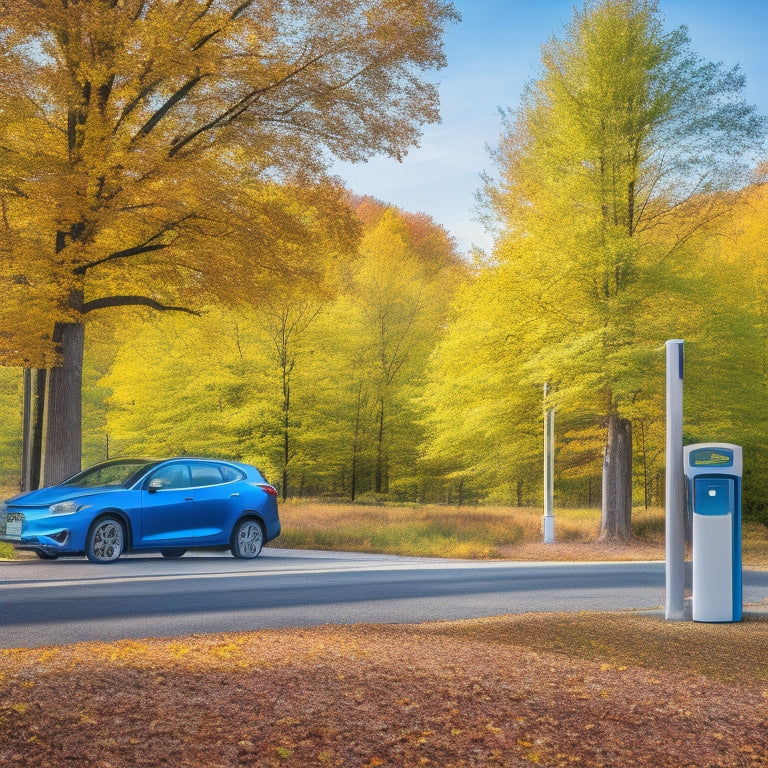
Connecticut's Exciting Electric Vehicle Incentives
Share
Connecticut offers a range of incentives to encourage electric vehicle (EV) adoption, supporting the state's climate goals. The CHEAPR program provides rebates up to $7,500 for eligible EV purchases or leases, while the CT EV Charging Program incentivizes electric vehicle supply equipment and fast charging stations. Federal incentives, such as the Electric Vehicle Federal Tax Credit, offer up to $7,500 in tax credits. Utility and financial offers, like Norwich Public Utilities' rebates and Mutual Security Credit Union's EV loans, further reduce the upfront cost of EV ownership. Exploring these incentives can uncover even more opportunities to switch to a sustainable transportation option.
Key Takeaways
• Connecticut's CHEAPR program offers rebates up to $7,500 for eligible EV purchases or leases, promoting EV adoption and reducing emissions.
• Federal incentives, including the Electric Vehicle Federal Tax Credit, provide up to $7,500 in tax credits for eligible EV purchases or leases.
• Utility and financial partnerships, such as Norwich Public Utilities and Mutual Security Credit Union, offer exclusive rebates and EV loans to make ownership more affordable.
• The CT EV Charging Program provides incentives for electric vehicle supply equipment and fast charging stations, supporting the state's climate goals.
• Additional resources, including Energize Connecticut and the VW Settlement webpage, offer education, incentives, and support for residents shifting to sustainable transportation.
State and Local Incentives
In Connecticut, various state and local incentives are available to encourage the adoption of electric vehicles. The CHEAPR program offers rebates of up to $7,500 for eligible EV purchases or leases. The state's VW Settlement funds support light-duty electric vehicle infrastructure projects. The CT EV Charging Program, administered by Eversource and The United Illuminating Company, offers incentives for electric vehicle supply equipment and fast charging stations, focusing on equity and inclusion in infrastructure installation.
Municipal programs, such as Norwich Public Utilities, provide rebates up to $1,500 for EV purchases or leases and up to $4,000 for EV charging equipment. These state and local incentives aim to promote the adoption of electric vehicles, reducing emissions and supporting Connecticut's climate and energy goals.
Federal Incentives and Credits
Beyond state and local incentives, federal incentives and credits also play a substantial role in encouraging the adoption of electric vehicles in Connecticut.
One of the most notable federal incentives is the Electric Vehicle Federal Tax Credit, which offers up to $7,500 in tax credits for eligible EV purchases or leases.
Additionally, consumers can receive up to a 30% federal tax credit for electric vehicle supply equipment (EVSE) and installation costs.
These savings opportunities can greatly reduce the upfront cost of owning an EV, making it more accessible to Connecticut residents.
Utility and Financial Offers
Through partnerships with local utilities and financial institutions, Connecticut residents can access a range of exclusive offers and incentives that make owning an electric vehicle more affordable and accessible.
-
Utility rebates are available through programs like Norwich Public Utilities, offering up to $1,500 for EV purchases or leases, and up to $4,000 for EV charging equipment purchase and installation.
-
Financing options are provided by institutions like Mutual Security Credit Union, offering EV loans to Connecticut residents in specific counties.
-
The Connecticut EV Charging Program, administered by Eversource and The United Illuminating Company, offers incentives for electric vehicle supply equipment (EVSE) and fast charging stations, supporting the growth of EV infrastructure in the state.
Additional Resources and Support
Connecticut residents can tap into a wealth of additional resources and support to help them navigate the process of purchasing and owning an electric vehicle. From educational initiatives to government-backed incentives, there are various avenues available.
For instance, Energize Connecticut provides resources and information to save energy and build a clean energy future. The state's VW Settlement webpage offers information on grant programs and future initiatives.
Additionally, community partnerships like Mutual Security Credit Union offer EV loans and membership benefits, promoting education and outreach on the environmental impact of electric vehicles.
These resources demonstrate the state's commitment to supporting residents in their shift to sustainable transportation, ultimately contributing to a cleaner environment and a healthier community.
Frequently Asked Questions
Do Electric Vehicles Require Special Maintenance or Repairs?
Electric vehicles require routine maintenance, including regular battery checks to maintain peak performance and extend lifespan. Additionally, proper tire pressure checks are essential for efficient energy consumption, handling, and safety.
Can I Charge My EV at a Friend's House or Public Charging Station?
When charging your EV at a friend's house or public station, practice EV etiquette by communicating with the host, respecting time limits, and being mindful of charging anxiety, ensuring a harmonious and efficient charging experience.
Are Electric Vehicles Suitable for Long Road Trips or Highway Driving?
When contemplating electric vehicles for long road trips or highway driving, range anxiety can be alleviated with thorough road trip planning, including identifying charging stations and optimizing routes to guarantee a seamless and enjoyable journey.
Can I Install an EV Charging Station in My Rented Home or Apartment?
Prior to installing an EV charging station in a rented home or apartment, it is crucial to obtain landlord approval, review renter rights, and understand homeowner rules and rental agreements, especially in apartment complexes.
Are There Any Electric Vehicle Models That Are Not Eligible for Incentives?
When exploring the electric vehicle landscape, it is crucial to note that certain models may not qualify for incentives due to model restrictions and incentive limits, such as luxury vehicles or those with high price points.
Related Posts
-

7 Best Cool Roof Rebates for Energy-Savvy Homeowners
You're an energy-savvy homeowner looking to install a cool roof, and you're wondering which rebates can help you save...
-

7 Best Geothermal Cooling Systems for Hot Climate Homes
You're evaluating geothermal cooling systems for your hot climate home, and you want to know the top options. Look fo...
-

7 Top HEPA Filters for Green Building Projects
You need a reliable HEPA filter for your green building project that aligns with your sustainable goals and guarantee...


